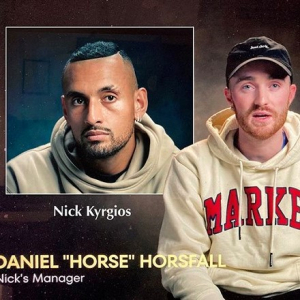Peter MALONE
Corsage
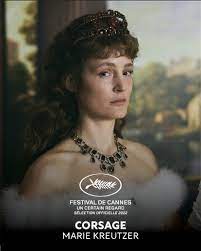
CORSAGE
Germany, 2022, 114 minutes, Colour.
Vicki Krieps, Florian Teichtmeister, Tamas Lengyel, Finegan Oldfield, Colin Morgan, Manuel Rubey, Alma Hasun, Aaron Friesz, Jeanne Werner, Katharina Lorenz.
Directed by Marie Kreutzer.
Corsage has a pleasant meaning, the flower arrangement to be worn on a special occasion. There is a corsage or two in this historical drama. However, it refers more explicitly to a corset, often seen literally here, but it is serving as a metaphor for constriction, restraint, difficulty in breathing, worn to give an illusion of a trim figure.
Audiences who watch Corsage will be eager when they return home to look up the details about Empress of Elizabeth of Austria, wife of Franz Joseph, dominant in the second half of the 19th century, the Hapsburg Empire, centred in affluent and splendid Vienna. But, when they do the research, they will find that the screenplay is often a work of fiction.
Some helpful advice. SBS frequently programs a trilogy from the 1950s, Sissi. Three films were made starring the young Romy Schneider as the very young Empress, her childhood, family in Bavaria, her marriage to friends Joseph, the early years, family, her attraction towards the Hungarian part of the Empire, her frequent travels. This will give something of a background to Corsage, many of the themes taken up in the setting of 20 years later, 1877-1878.
Vicki Krieps (Phantom Thread) gives a commanding performance as the Empress, turning 40, with children including the Crown Prince and the young daughter, Valerie, feeling her age, conscious of criticisms of her appearance and weight (hence the frequent corset sequences and her being weighed). The relationship with her husband is quite formal. The Crown Prince is concerned about her, her state of mind, her love for travel, her preferring to stay in Hungary rather than in Austria.
A 21st-century response to this film about a royal family will depend on our own attitudes towards royalty – and, for most, the main royal family of our experience is that of Britain. With the death of Queen Elizabeth and the accession of King Charles, with the background of the history of Diana, with Andrew and his scandals, with the alienation of Harry and Meghan, audiences may watch this story of a royal family, their sense of entitlement, their lavish and expensive lifestyle, their being on public display, with contemporary judgements about royalty.
There is a lot of pomp and circumstance, singing of the national anthem, with honour to the Emperor and Empress, marching guards, elegant 19th century costumes, banquets and formality, servants everywhere, bowing and scraping, kowtowing atmosphere, and servants at every door, capable of hearing every bit of gossip and scandal. And, there is gossip, with the friendship of the Empress with her cousin, Ludwig of Bavaria, and his frequent presence at the court of Vienna. On a visit to England, where Elizabeth is able to indulge her passion for horse riding, there are rumours about her relationship with her trainer, Bay.
But, audience catches some detail or hear some music and realise there are some 20th-century insertions in this narrative. There is a glimpse of a typewriter, a cigarette lighter, a heroin needle, a tractor, 20th-century touches of architecture – and, amongst the songs as background, Kris Kristofferson getting a nod with Help Me Make it through the Night, and Mick Jagger with As Tears Go By. So, a look at the 19th century but something of a reassessment, reminders here and there of change, progress, and the demise of royalty. (After all, 36 year later there will be the assassination at Sarajevo World War I.)
Particularly startling is a young Frenchman who has invented a motion picture camera – and some insertions of film with Elizabeth, image and not hearing her voice (which is critical and shouting). And this is 18 years before the Lumiere Bros first film clips.
So, a strange experience, an immersion in traditional historical storytelling, an invitation to critique from a 21st-century point of view, and those anomalies of invention inserted into the past.
Spoiler alert: don’t believe the ending in Ancona, Italy. Elizabeth lived until her assassination in 1898.
- The title, reality of the corset for the Empress, symbolic, the straitjacket in of royal life and duties? The need to break free?
- A fictionalised story of the Empress Elizabeth, how much truth, how much fiction? 1877-1878, her turning 40, the end of childbearing, status as Empress, relationship with the Emperor, with her children? Audience knowledge of the historical facts?
- The 21st-century perception of royalty, royal families, status, power, expectations, public events, on show, state meals, guests, international connections? Sense of entitlement? Yet the restrictions, the continued demands, the public, media, politics?
- Vicki Krieps, her performance as the Empress Elizabeth, at 40, her history as Empress, 20 years, standing by the Emperor, her relationship with Crown Prince, with Valerie, loving but detached? The issue of Hungary and her wanting to be in Hungary, her Bavarian background, the relationship with her cousin, Ludwig, his visits, intimacy? Her love of travel, being away, the sense of freedom, the horse riding symbolic of this? The visit to Hungary and her feeling at home? The visit to England, the holiday, Bay, her horse riding, the intimacy, her reaction to the rumours? Her staff, her relationship with Maria (and forbidding her to marry even though it was her final chains), the maids and treatment of the maids?
- The Empress and her consciousness of figure, weight, the frequent scenes of the putting on the corset, typing it, getting weighed? Public comment about her figure? The Empress comments?
- The Emperor, the Hapsburg Empire, his relationship with his wife, absences, his children, discussions with the Crown Prince? Sexual relationship with his wife? His expectations of her, to appear in public? His irritation of her being in Hungary, travels? The Empress later asking the young woman to be the Emperor’s mistress?
- Ludwig of Bavaria, his personality, presence in the court, cousin of the Empress, their sequences together, play, touches of intimacy, his sexual orientation?
- Members of the court, the Empress and her training with fencing, the artist at her posing, urging him to use her past portraits? Waiters, chefs? And the servants standing at the doors able to overhear everything?
- The Empress, with her daughter, her daughters very adult behaviour, critical of her mother, concerned about her mother, their various interviews?
- The visit to England, the English aristocracy, their welcome, her love for horse riding, Bay and his coaching, suggestions affair, the Empress cutting him off?
- The visits to Hungary, her being at home there, for many years, Marie and the offer of marriage and the Empress’s refusal? The various courtiers their attention to the Empress?
- The public appearances, the singing of the national anthem, the formality of the occasions, the Empress fainting, her later explanations how to fake fainting, rehearsing it, Ludwig’s attempts?
- The continual corset imagery, weighing, being thin, exercise, horse riding and the fall? Impetuous in cutting off her hair, the maid whose whole career was to cut the hair and her dismay?
- The decision to travel to Italy, with her companions, the sea, the boat, her diving into the sea?
- An imaginative interpretation of the personality of the Empress – and the connection with the events of 1877-1878?
Daramalan College Alumni, achievement with the Daramalan spirit.
Daramalan College Alumni, achievement with the Daramalan spirit.

Over the years, the Daramalan Alumni Facebook page chronicles some of the ex-student achievements. We have posted quite a number of these stories – a tribute to the MSC spirit in education.
And there is Nick Kygios and his manager, see at the end.
Ex-Dara student nominated for ‘Australian of the Year’ Award.

In a wise decision from the selection committee, ‘our’ Heidi Yates from 1998, was one of four ACT nominations for the 2023 Australian of the Year Award.
Heidi, a human rights lawyer and community advocate, is currently the ACT Victims of Crime Commissioner. She graduated from the ANU College of Law in 2004 and spent the next
18 years working at Legal Aid ACT, the Women's Legal Centre and the ACT Human Rights Commission.
She is a passionate advocate for better outcomes for women, elder Australians, people living with disabilities, LGBTIQ+ people, Aboriginal and Torres Strait Islander peoples and survivors of violence. Her work has inspired other communities to demand similar positive change
Rotary Emergency Services Awards

Last week, the Governor-General David Hurley hosted the Rotary Emergency Services Community Awards at Government House, with two of the four finalists being ex-Daramalan students.
The first winner was ACT Policing’s Senior Constable Loryn Reynolds (Hunter) from 1998 who was recognised for her services in a number of areas, most recently as a peer support officer in the ACT Police Welfare Team. She had previously been presented with the Commissioner’s Medal for Conspicuous Conduct for going above and beyond her regular duties. After 15 years with ACT Police, Loryn is also a long-time member and Chair of her children’s school board and in her spare time, coaches a local basketball team and supports regional agricultural shows as a judge and steward.
Nick Kurgios, yes, but his manager, Daniel Horsfall
Netflix ‘Break Point’ series with Nick Kyrgios (2012) being the subject of the first episode, appropriately entitled ‘The Maverick’.
It’s well worth watching – probably won’t change any existing opinions – but it’s also great to see interviews with his manager, and best friend from school, Daniel Horsfall.
Daniel is usually pictured in the player’s box during the TV telecasts. Incidentally, for those who weren’t aware, Daniel is the son of Daramalan teacher Rebecca Willimott.
Stage Mother
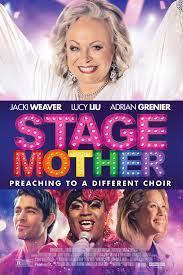
STAGE MOTHER
Canada, 2020, 93 minutes, Colour.
Jacki Weaver, Lucy Liu, Adrian Grenier, Mya Taylor, Alaster McDonald, Oscar Moreno, Jackie Beat, Hugh Thompson, Anthony Skordi.
Directed by Thom Fitzgerald.
Director Thom Fitzgerald has made films with gay themes for over a quarter of a century, The Hanging Garden, The Event, Three Needles, Cloudburst… He is Canadian and this is a Canadian production, with settings in Texas and San Francisco but filmed in Nova Scotia.
What would happen if a churchgoing, choir-conducting matron from Texas inherited a gay club in San Francisco?
The film establishes the gay club, failing business, rather gaudy, sometimes coarse acts, and the owner, taking drugs, collapsing on stage and dying. In fact, he is the matriarch’s son, dying without a will and so she inherits the club.
This film is a star vehicle for the very versatile Jacki Weaver, establishing her career in Australia for many decades, and receiving an Oscar nomination for and finding a whole new world of filmmaking in North America. In this film, she is the devoted mother, Maybelline, cut off from her gay son for a decade, remembering in flashbacks her happy times with him, going to San Francisco for the funeral, put off by the very camp ceremony, clashing with her son’s partner, Nathan (Adrian Grenier).
What helps her is the friendship with an unmarried mother, sienna (Lucy Liu) with a baby. This leads to Maybelline becoming more involved with the club, using her background in choir to train some of the drag Queens in harmonies, getting better outfits, opening the club with a new program, despite the hostility of Nathan. There is a personal touch, distance from her husband back in Texas, the encounter with the concierge at a San Francisco hotel and dating him.
As expected, in this kind of genial drama, there is ultimate success in the club, with Maybelline herself finally singing on stage. But, she is a stage mother, involving herself in the complex lives of her three main drag Queens, gender transition, drugtaking, family alienation.
On the IMDb it has an enormous amount of sympathy and support.
- A genial, gay-friendly comedy-drama? The San Francisco setting? Filmed in Nova Scotia?
- The contrast between Texas, the small town, everybody knowing each other, church, choir, attitude towards homosexuality, and San Francisco, the vistas of the city, streets, the Castro district, the club, interiors?
- The musical score, the range of songs, performance?
- The opening, Ricky, preparing, the acts in the club, the audience, collapsing on stage, his death, Nathan and his reaction?
- Texas, Maybelline and Jeb, years of marriage, Jeb’s disapproval of his son, cutting off contacts for years? Maybelline, friends, the choir? The news of Ricky’s death? Her decision to go to San Francisco, Jeb’s disapproval?
- The funeral, Dusty officiating, the camp style, the guests, the performances? Maybelline arriving, wary, put off, leaving, Nathan seeing her, his attack on her?
- The situation, Ricky owning the club, Nathan being manager, the partnership, the relationship? The financial situation? The decline in audience?
- Maybelline, the encounter with Sienna, the baby, the friendship, going to the apartment, Maybelline looking after the baby, Sienna and her background, link with Ricky, with the club? Her back story, relationships? The meal, Nathan coming to the meal, his anger, taking Maybelline to see Ricky’s apartment? All the theatrical gear?
- Maybelline, not going back to Texas, the phone calls, going to the club, her studying the legal papers, the ownership, friendship with the staff, the barman and his playing the piano and singing, the other members, the encounter with Dusty, the stage mother, upset, leaving? Nathan and hostility? Maybelline and her initiatives, the remaining trio, the singing practice, their harmonies, costumes, the new act, the posters, going to the hotel, meeting August, his response to her, the posters, inviting him to the opening, the later meal together, not explaining her husband, her kiss? And later his bewilderment at seeing her with her husband?
- Success, the range of performances, the piano playing, singing? Nathan eventually reconciling?
- The back stories, Joan, her name, drugs, singing capacity, taking the drugs, Maybelline finding her, going to the house, destroying the drugs, her motherly advice? Tequila, the severe woman in the street, his mother, Maybelline and the baby going to visit her at work, sharing mother’s stories, inviting her to the club, the mother coming, accepting her son? Cherry, transition, being held up, going to visit the wife, the need for permissions? The characters of each three, together?
- Jeb, coming to San Francisco, wanting to sell the club, Maybelline and her difference? Keeping the club, the conditions? Her going back to Texas, meeting her friends? The decision to leave? The encounters with her sister, the sister’s visit to San Francisco, loud? Her sister giving her the money when Maybelline returned?
- Meeting August again, the bond with him, the success of the club?
- Maybelline, the stage mother, but her performance on stage, the reconciliation with Nathan, his support?
Embattled
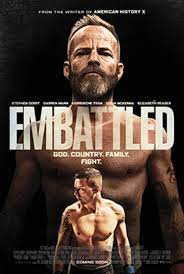
EMBATTLED
US, 2020, 117 minutes, Colour.
Stephen Dorff, Darren Mann, Elizabeth Reaser, Donald Faison, Said Taghmaoui, Karruecje Tran, Ava Capri, Colin McKenna.
Directed by Nick Sarkisov.
There are two battle areas going on in this drama. There is the arena of multi-martial arts. There is the arena of the family.
The film initially focuses on Cash, a strong performance by Stephen Dorff, unsympathetic to the audience, playing a champion who has won every title. He has been married but has walked out on the family when his second son is born with Williams Disease, a physical and mental disability. He has married again and has another child. He is full of himself, macho attitudes, misogynistic, homophobic, a loudmouth.
Then the film introduces his son, Jett, Darren Mann, 18, finishing at school, ambitious to fight in the martial arts, going to training, then encountering his father who offers advice, spars with him, humiliates him. And Jett is living with his mother who has to make ends meet waitressing. And the young brother is played by Colin McKenna, son of the writer of the film, David McKenna.
There are the expected conflicts within the family, Jett and his relationship to his mother and brother, a friend from school, his setting up his mother with one of the staff at the school, a veteran, disabled.
With the hostility from his father, he seeks out the only champion who has defeated his father and goes into coaching with him for a month. There is a press conferences and hostilities leading up to the final dramatic bout.
Achievement for Jett, a humiliation for Cash – and wondering whether he again admit the truth about himself and his son.
- The title? The battles? The MMA, the fights, brutality, skills, the crowds, fans, referees? The family battles?
- The Alabama setting, the city, homes, mansions, gymnasiums, fight centres, school? The MMA world and the ordinary world? The musical score and tone?
- The introduction to Cash, Stephen Dorff’s presence and performance, physical, age, champion, battle scars, a complete winner, his pride, business sense and dealings? His macho attitudes, misogynistic, homophobic, sexually exploitative? The background of his first marriage, the birth of Quinn, his disappointment, leaving the family? His second marriage, his son? Living a presumptuous life?
- The introduction to Jett, his age, school, friends, relationship with his mother, with Quinn, caring for him? The absence of his father and the effect? His interest in MMA, the training? The initial encounters with his father, his father being tough, demanding, imposing match our expectations, treatment of women? His skills?
- Cash, interest in his son, training, the fights, his son success? The growing rivalry? The spar with his son, the unlawful hit? Business deals, promoting his son, interstate travel, bouts?
- Jett, at home, his mother, weary, her waitressing? At school, meeting Keaton, the attraction? Her being supportive of the family, Quinn? Quinn, Williams syndrome, the disability, yet his being outspoken, relying on his mother and Jett, school, the film’s plea for consideration (and the actor being the son of the screenwriter)?
- The teacher, war hero, crippled, Jett setting up the meeting between his mother and the teacher, the consequences?
- The setting up of the confrontation between father and son? The press conferences and their attitudes, questions and answers?
- Jett seeking out Claude, Claude the only one to defeat Cash, the interview, Claude taking on the training of Jett, over the months, the scenes between them, Claude is supportive?
- The buildup to the fight, jet and his mother, supporting her son? The school, Keaton and the television, support?
- The climax of the final bout, the ups and downs, Cash and his determination to win, bad spirit, Jett, fighting back? The verdict?
- Cash and his treatment of his second wife, son, derelict, with women? His wife having enough, walking out, seeking help from the first wife and Jett?
- Jett and the MMA battles, embattled, at home and family, embattled?
Poppy Field/ Camp de Maci
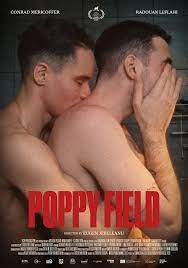
POPPY FIELD/ CAMP DE MACI
Romania, 2020, 82 minutes, Colour.
Conrad Mericoffer, Alexandru Potocean, Radouan Ldflahi, Cendana Trifan Alex Calin.
Directed by Eugen Jebleeanu.
A brief Romanian film focusing on sexuality, sexual orientation, homophobia, national legislation.
With its confined action to an apartment and to a cinema for most of the plot, and the reliance on dialogue and issues, the screenplay could have been a piece of theatre.
The film indicates that there is a great deal of homophobia in post-Communist Romania, those in same-sex relationships having to keep this secret, not wanting to be exposed and shamed, and not wanting to lose employment.
The central character, a policeman, is having an affair with a flight attendant from Germany. The opening sequences focus on them in the apartment. But, then, the policeman goes to work, call to a riot in a cinema where the police have invaded the screening of a lesbian film, upsetting those who have bought tickets, loud slanging matches. But, they are overwhelmed by the number of protesters, banners, Christian icons, loud, condemnations of homosexuality. Some of the protesters are particularly strident and shouting, especially an older woman who symbolises the protesters.
However, the policeman encounters a young man with whom he had an experience earlier, hitting him, the young man then going to the police to tell the truth.
A great deal of the film shows the policeman kept apart in the empty cinema all, discussions with the police, those supporting him, those condemning homosexuality.
There is a long sequence in the car with the policeman talking to his superior – leaving the audience wondering about their relationship and the final farewell, kisses.
The film takes his place along with so many others about homophobia, the criminalisation of homosexuality, and a look at Romanian society as it emerged from the communist era.
- Romania in the 2020s? Moral issues? Homophobia? Religion?
- The Romanian city setting, apartments, police precincts, the streets, the cinema, interiors? The musical score?
- Issues of homophobia, the traditions of the Communist palace, the transitions from communism, the calling out of 60-Marxism? Religious demonstrations?
- The story of the in this context? Background, stories about his mother, the visit of his sister and his relationship with her, his homosexuality, secret, revelation of liaison is in the past, his police reputation, his relationship with Hadi, the demonstration of the cinema, observing, interacting, the challenge from the man, hitting him, wanting to interrogate him? The reaction of his fellow officers? Homophobic? Supportive?
- Meeting with Hadi, flight attendant, from Germany, the liaison, beating, parking, the elevator, in the house, sexual atmosphere, yet Christi’s tone, going to work, not wanting a trip to the mountains, the visit of his sister, the gifts of food, her chatting with Hardy?
- Christi going to work, the demonstration, the audience, the cinema, the lesbian film, the demonstrators, the older woman and her shouting, the banners, the icons? The reaction of the audience, civil rights, paying to see the film? The police reaction, wanting to see ID, the crowd reacting, their rights? The various individuals and their reactions, stances?
- The gay man, challenging Christi, asking him, taunting him, the fight, Christi hitting him, his speaking to the police, about Christi and his past, the police reaction, supportive of Christi?
- Christi, in the empty cinema, the reactions of the various police, conversations, keeping Christi apart, reporting to the authorities? Is eventually getting out? Anger?
- The superintendent, the conversations with Christi, their friendship, the scene in the car and the long conversation and story, Christi listening, driving him away at the end, letting him go home – and the final subtitle, Kisses?
Swimmer, The/ Israel
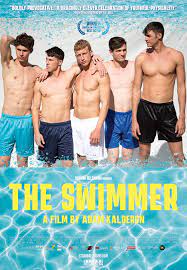
THE SWIMMER
Israel, 2022, 81 minutes, Colour.
Omer Perelman Striks, Asaf Jonas, Ofek Nicki-Cohen, Nadia Kucher, Igal Reznick, May Kurtz.
Directed by Adam Calderon.
The swimmer is an Israeli film, focusing on a young swimmer who goes to a training session in order to get a ticket for the Olympics.
There is a great deal of swimming in the film, filmed on the surface, overhead, underwater, exercises in training, competitive swimming. There is the coach, Jewish coming from Siberia, critical of conditions in Israel. He has an unexpected assistant, a woman who is able to work with him, but, in her appearance, size and weight, seems unlikely as a swimming coach.
The swimmer of the title is Erez, brought to the training by his father who knew the coach in the past and who himself, as well as his wife, were competitive swimmers. He has expectations for his son. Erez is very competitive, and praised by the coach as well is by the former Olympic gymnastics champion who manages the Centre for training.
The other swimmers are not particularly well delineated as characters. They are there, background to the rats. However, there is an Nevo, a champion swimmer his father is a Consul in London. Ere feels attracted to an Nevo despite talking about his girlfriend from the kibbutz and a scene with her. Any friendships are strictly taboo according to the coach.
However, Erez is emotionally tangled, attracted an Evo, jealous of him when he pays attention to a young gymnast and merits arranges to be expelled because of her physical’s condition and illness.
With the final competition, Erez then baulks at the final moment, allowing Nevo to win.
Generally an understated film about gay relationships, the film relying on some show are sequences to suggest the homoerotic.
- The title? Swimming, training, exercise, competitive, the Olympics?
- The ideals of swimming, sports achievement, competitive and winning?
- The of swimming sequences, close-up, underwater, aerial? The exercises and their demands? In the opening credits and the shaving?
- The Israeli settings, the kibbutz, the compound, the pool, the countryside, the ruins? The musical score?
- Erez and his story, background, his competitive father, his competitive mother, the glimpse of them on the phone, his conversations with them, his father taking him to the training? His ambitions? Physique, exercise, skills in the water, the coach’s hopes, his own ambitions, not liking the water, but liking winning? Meeting the others in the group, meeting Nevo, interest in him?
- The role of the coach, from Siberia, criticisms of Israel, work at the pool, attitudes towards coaching, his demands, rules, single-minded, swimming as individual sport, checking relationships, distractions? In action at the pool, with Erez, with Nevo, his knowing Erez’s father in the past?
- His assistant, female, unexpected, her work, roll, favouring Erez, the photo, getting herself ready, thrown into the pool?
- The compound, Paloma, in charge, her past, gymnastics and Olympics, the effect of such dedication on her life, her disappointments, Erez asking why she accepted this “dump”? Her favouring Erez? Maya and Erez reporting her, her being sent from the compound? The later criticisms of Erez by the other members of the team?
- Erez, personality, talk about his girlfriend, her visit, the kibbutz? His attraction to Nevo, with him, talking, the birthday cake, with the group, the shower sequences, shaving him?
- Nevo, background, his father Consulate in England, competitive, training, the friendship with errors, with the other men in the group, special attention, his meetings with Maya, her expulsion? The testy relationship with Erez, allowing him to shave him? The final swim? Winning, the Olympics?
- The other members of the team, their personalities, working together, swimming and training, shower sequences? Competitive?
- The finale, Erez and his growing desperation, dying his hair, shaving his head, the coach critical, the final swim, his father present? Is doing well? Letting go at the end and Nevo winning?
- And the surreal fantasy of the team and their dance sequence in the empty pool, intercut with the swimming?
Kid Detective, The
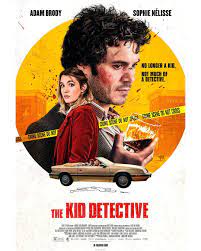
THE KID DETECTIVE
Canada, 2020, 100 minutes, Colour.
Adam Brody, Sophie and Elyse, Wendy Crewson, Jonathan Whitaker, Jesse Noah Gruman.
Directed by Evan Morgan.
At school, Abe was a whizz at solving some mysteries, missing goods, stolen goods, miss behaviour. He had quite a reputation and the newspaper headlines and pages to prove it, framed in his office.
But, at 32, he has fallen on lean times, a disappointment to his parents, a secretary who seems to disapprove of him, drinking a lot, minimal cases for him as an adult detective. His played by Adam Brody.
There is a story of a murder, a young Asian student from school, his body found, 17 stab wounds.
The young Asian (Patrick) has a girlfriend from school, Caroline. One day she comes into Ames office and asks him to investigate. He is wary, bumbles a lot, but she insists, even driving him around, trying to help with information.
So, this is a somewhat offbeat private investigator mystery, a whole range of subjects, young people from the school, drug dealers from the school, a visit to Patrick’s anxious parents, targeting one of the boys from school (going to his house, hiding in the closet, the boy’s younger sister finding him and is being taken to the police station).
He also has interviews with the school principal whom he knew from his own school days and solving one of the mysteries. He also breaks into the principal’s house – with revelations about the principal’s behaviour, the disappearance of a young girl from school, and quite a plot twist when she is found alive and her relationship with Caroline.
An easy entertainment, variation on private investigation.
- The title, expectations? A, at school, precocious, solving cases? The transition to adulthood, decline, drinking, careless? And a final case to solve? Becoming a hero?
- A Canadian production, the Canadian town, homes, school, offices, the streets, the river? The musical score?
- The introduction to A, at 32, in decline, his office, his secretary and her attitude, the newspaper headings on the wall? Past achievement? His status in the town, criticism of his parents?
- Abe is a boy, his abilities, the students coming to him, his solutions, quick, achievement, the school principal and his case? Gracie, her disappearance? The ice cream store, a lifetime of ice cream? Admiration for him? The newspaper headlines? Family pride?
- The present, his office, not getting jobs? Caroline, in his office, her story, at school, her relationship with Patrick, his death, many stab wounds, the search of the river? The secretary and the mineral water? Abe deciding to take the case?
- The investigations, hit and miss, interrogating the kids, the drugs, the store? His hitting the young kid? Patrick’s parents and their concerned? His promises? The student, at his computer, under suspicion, his sister and the computer? Abe searching the house, the snacks in the drawer, hiding in the closet, getting out, his arrest, the police interrogation?
- Caroline, her concern, help, driving a, puzzles? Her background, grandparents?
- The visit to the principal, discussions of the past, the principal and his reputation? Memories of the initial case?
- Abe, suspicions, searching the principal’s house, his being discovered? Confrontation with the principal, the story of Gracie, the baby, Caroline? The principal stabbing himself?
- Abe, searching the grounds, the heart, finding the adult Gracie, her condition?
- Revealing the truth to Caroline, her accepting it?
- Abe, his parents happy with him, the magazine articles, his achievement, a hero in the town?
Spoiler Alert
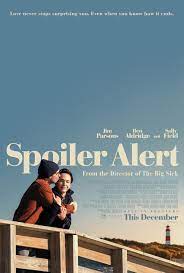
SPOILER ALERT
US, 2022, 112 minutes, Colour.
Jim Parsons, Ben Aldridge, Sally Field, Bill Irwin, Brody Caines, Tara Summers.
Directed by Michael Showalter.
This has all the ingredients of a romantic comedy but, also, the film opening with its own spoiler alert, a film about terminal illness.
This time the focus is on a couple, Mike and Kit, Jim Parsons and Ben Aldridge.
Mike is a TV interviewer and writer, quite workaholic. The film uses an entertaining device to give Mike’s background, seeing his life as a boy, fat boy, as a television sitcom, he the star, coming home, centre screen, interactions with his mother and his rather slacker older brother. And with a taped audience laughter track. These are inserted throughout the film as Mike thinks about himself and assesses his life.
Kit, on the other hand, is outgoing, professional photographer, pleasant company. In fact, they meet at a gay bar where Mike is very reticent, Kit friendly, and, with Mike doing a voice-over narration throughout the film, he explains that this was his falling in love. The two men are very different. Mike is a variation on Jim Parsons’ television screen persona, somewhat neurotic, prissy and mannerisms. Kit is easy-going but, as we saw early in the spoiler alert, it is he who will have the terminal illness.
The film has various variations on the romcom genre, the contrast between the two apartments, Mike’s absolutely full (an understatement) of Smurfs, toys, a lifetime’s collection and indulgence on eBay, all the commercial goods. Kit’s is just ordinary. They continue with their work. A variation on an odd couple. The years pass, the years indicated by a collage of Christmas cards and greetings, in fact, over a decade. But, with guests at Christmas dinner praising them for their being together, there are some revelations about the tensions between the two, some living apart, visits to the therapist (amusing in their way each with their different personality trying to explain themselves to the therapist) – and an interesting final comment by the therapist that while they might love each other, they are also resentful of each other.
And the issues of coming out? Mike has been out all the time, family acceptance. Kit has not been able to confide in his parents. When he is in hospital with appendicitis, they come to visit. His mother is an absolute whirlwind, dominating, ordering everyone about, including her genially submissive husband. The mother, Marilyn, is a latter-day star vehicle for Sally Field and she makes the most of it, gradually moderating. Husband Bob, Bill Irwin, is happy to go along with what his wife orders, not put down in the least. Later, the audience will see them again, especially on a holiday at the coast that Mike organises as Kit is convalescing.
While there is the scene of the gay club at the beginning of the film, more or less as seen in any other film, Spoiler Alert moves away from movie stereotypes of gay men and gay behaviour, enabling the wider audience to empathise with the two.
And, how to deal with terminal cancer? Mike is dismayed, fussy, intervening with doctors, wanting remedies. Kit, on the other hand, is generally calm, more accepting, though not without his sadness and apprehensions. And, suddenly a marriage proposal, a ceremony (very brief with an exceedingly offhand and seemingly uninterested judge) at City Hall.
It means that the dying sequence, which we know is going to happen, is all the sadder, the audience by now emotionally involved, Kit in hospital, his parents coming for his death, Mike and his grief. There is a disconcerting moment in the screenplay when Kit’s illness suddenly becomes part of a television show and Mike a television interviewer – but, back to the sadness of the reality, and Mike able to understand kit, his illness and suffering, and his own grief and of further bonding with Marilyn.
Based on a true story, a book, and its author, Michael Ausiello serving as writer and executive producer.
- A true story, the original book, the author and his contact with Jim Parsons, the idea to make a film? The author as executive producer?
- The New York story, journalists and TV coverage, photographers, the gay bar, gay friends? The musical score?
- The spoiler alert at the beginning, Kit and his illness, dying? Mike, the voice-over, the personal investment in telling the story, the various stages of the story, the detail, his own observations?
- The device of having the television show, Mike and his memories, the young Mike, his mother, fat, brother and sister, the home situations, the comedy, the live audience laughter? Insertion throughout the film?
- Mike, his work, diligent, invited to the bar, standing aside, observing, seeing Kit and Nina, Kit approaching him, persuading Mike to dance? Going to Kit’s place, the encounter, Mike and his observations, falling in love?
- Mike, his personality, more than a touch of the neurotic, prissy manner, the effect of falling in love with Kit, being together? His memories through the television sitcom? The growing bond between the two?
- Kit, his personality, outgoing, strong, attracted to Mike, the visit to Mike’s apartment, all the Smur’s? The different personalities, yet their bonding?
- Their life together, the years passing, the device of the Christmas greetings?
- The ups and downs of the relationship, Kit and his being with Sebastian, not telling the truth to Mike, Mike and his suspicions, upset? The Christmas dinner, being praised for being together, the telling the truth, the separations?
- The various therapy sessions, the different issues, the different sessions, the contribution of each, complaints, the therapist, his comment about their love for each other despite presenting each other?
- Kit, not revealing that he was gay to his parents, Kit and his appendicitis, the visit of his parents, the puzzle about Mike?
- The parents, mother and her dominance, intervening, telling Bob what to do, his being genial, not put off by Marilyn’s persistence? Parking the car and the difficulties, the visit to Kit, the puzzle about Mike? Going back to Kit’s apartment, Kimberley there, flatmate, the puzzle about why Mike was there, that he knew where the blankets were…? And Kit finally coming out with the truth, the parents and their unexpected sympathetic reaction?
- Kit, the growths, going to the doctor, Mike, apprehensive, ultra-nervous, intervening, the contrast with Kit accepting? The biopsy, the various doctors, the hopes, the doctor who stated that was severe? The chemotherapy and the consequences, the radiation and the relief? Going to the ocean, Bob and Marilyn joining them, the happy times of the sea?
- Kit and his deterioration, Mike and his making parent friends with the parents, the meal together and Kit’s announcement, Marilyn her chatter about the racing, covering her grief, the glimpse of her weeping?
- The sudden decision to marry, going to the courthouse, the offhand manner of the judge, yet their happiness?
- Kit, deteriorating, the increase of growths, the time limit, in hospital, Marilyn and Bob coming, Mike and his grief, the nurse saying that Kit could hear everything, the parents and their farewell, Mike and his farewell, lying with Bob? His death?
- The funeral, Mike and his eulogy, conversation with Marilyn afterwards?
- The false ending, the television show, Kit as the actor, being interviewed by Mike, the urgency to get back to camera, the questions, the dramatisation of how Kit felt and his being able to let go?
- The sadness of the ending, the pathos, the story of an odd couple, a gay couple, ups and downs, love, death?
Son, The

THE SON
UK/US, 2022, 123 minutes, Colour.
Hugh Jackman, Laura Dern, Vanessa Kirby, Zen McGrath,
Directed by Florian Zeller.
When seeing the plain, bold title, The Son, many audiences will remember the equally bold title, The Father, the award-winning film of 2020, winning Anthony Hopkins his second Best Actor Oscar. While there have been many films about ageing and Alzheimer’s, The Father takes its place as one of the best of them. The audience was immersed in the central characters continual bewilderment, experiencing Alzheimer’s through their empathy with the father. The Father is currently available through SBS on demand.
Now, with a focus on a teenage son, the issues are more complex – although we might recognise the depressive behaviour of Nicholas (Melbourne actor Zen McGrath) before his parents belatedly realise their son’s condition. There has been some criticism of Zen McGrath’s performance, calling it one-note. But, how else does an actor communicate the inner depths of confusing depression, the loss of any zest for life, wishing out of life?
But, before we are introduced to the son, we are introduced to the parents. The film is, in fact, a star vehicle for Hugh Jackman (originally Sydney actor) who is able to combine charm with being unable to appreciate his son’s condition and how best to help. He is Peter, married for the second time, his wife is Beth (Vanessa Kirby, whose performance as a pregnant woman in Piece of a Woman should be seen). They have a newborn son. Then we meet Kate, a passionate Laura Dern and, Peter’s ex-wife with whom Nicholas lives. She is in some anguish because she discovers he does not go to school, does not want to live with her anymore.
And so, the stage is set for an exploration of adolescent mental illness, its effect on a teenager’s life, a more than melancholy grip from the inside, a longing for escape from this pressure of life. And the stage is set for relationships between parents and son, loving, yet inadequate, not perceptive, the parents dismayed as they discover more and more about the inner life of their son.
There is a powerful sequence when Peter visits his politically ambitious and successful father, Anthony Hopkins, whose only advice to his bewildered son is to get over himself, leaving Peter to wonder whether he is now repeating the patterns of his father’s treatment of him.
Then there is the profound issue of the effect on a child of the parents’ divorce.
Many audiences will bring their own and family experiences to this film, assessing the portrait of a depressed teenager, silent, sullen, taciturn, avoiding all responsibilities, cutting himself, wishing himself out of life. Some have been critical of how realistic this portrait is. Others, surrendering themselves to the characters and their uncertainties, their searching, will be caught up emotionally. Depending on age, perhaps, younger audiences well be empathetic towards the son. Older audiences, particularly parents and, more particularly, parents with adolescent children, will be empathetic towards the mother and father. They are trying to do their best but they discover their best is inadequate. Then there is the further complication of Nicholas moving in with his father and Beth, the little brother, and Beth becoming more and more aware of Nicholas’s condition.
Eventually, Nicholas spends time in hospital, the parents bewildered, Nicholas demanding to come home, and audiences being asked at the same time what decision would they make – his staying for treatment or his coming home?
The screenplay speculates at the end on what would happen if Nicholas were treated well – and if he refused treatment.
Writer-director, Florian Zeller, French playwright, working with British playwright and screenwriter of many decades, Christopher Hampton, draw us into observe the life and tragedy of The Son.
- The title, the theme, father and son? Mother and son? Family?
- The New York setting, the atmosphere of the city, buildings and streets, the skyline, apartments, offices, hospitals? The musical score and atmosphere, evocative?
- The focus on family, the nuclear family, Peter and Kate, their marriage, the birth of Nicholas, the flashbacks to childhood, Nicholas as a baby, as a six-year-old, having the courage to swim? The breakdown of the marriage? Peter, the encounter with Beth, divorcing Kate, marrying Beth, the birth of their son? Nicholas and his living with his mother?
- The portrait of Peter, in himself, successful at law, business, promotions, colleagues, the invitation for the political campaign, the meetings? His relationship with Beth, at home, the baby? His prospects? And the memories of his demanding father? The importance of the visit to his father, the portrait of his father, business, hard, scoffing at his son, the meal, the discussions, the memories, the brusque attitude of the father, telling Peter to get over himself, no sympathy? And Peter’s growing awareness that he was repeating his father’s pattern with Nicholas?
- Kate, loving Peter, the happy years, the divorce and its effect on her, Nicholas with her, adolescent, her concern, visiting Peter at the apartment, the story about Nicholas not going to school, Nicholas not wanting to stay with Kate, wanting to stay with Peter?
- Beth, her relationship with Peter, the baby, their love for each other? The prospect of Nicholas moving in, her accepting this, preparing the room? Her time with Nicholas, discovering the truth that he was not going to school, telling Peter? The dinner date, no babysitter, her not wanting Nicholas to be babysitter, his overhearing her comments, the issue of the disappearing earrings and his returning them?
- Nicholas, his age, the comment about his one-note performance, then dramatising and adolescent immobilised by depression? Loner, avoiding school, walking, cutting himself, the knife under the bed and Beth discovering it? Peter and his confrontation about the knife, not understanding? Nicholas, the day at school, not returning? The background of his writing? The story of his going to the party, his father buying him the jacket? Watching television? His seeming to improve? Smiling?
- Peter, his being busy, away from home, the prospect of the campaign, support from his colleagues? The phone calls about Nicholas, coming home, confronting Nicholas, the discussions, his not appreciating the depression, and his demands on his son, like his father on him?
- Nicholas and his constant reference to the happy times when his parents were together, the blame for the divorce, his father hurting Kate and himself, Nicholas and his feelings of inferiority because of the divorce and the consequences?
- The therapist, Nicholas and his discussions? Seeming improvement, Nicholas cutting himself, Beth discovering him, the ambulance, in hospital?
- The role of the doctors and nurses? Peter and Beth, the interviews, wanting to see Nicholas? His staying in hospital for several days, the coming of the interview? The psychiatrist? His advice, wanting stabilisation, more treatment? Nicholas 17, his parents having the right decision about his future at that time?
- The audience, listening to the arguments, Nicholas coming in, his plea, not wanting to be in hospital, not trusting the doctors and nurses, pleading? What would the audience do?
- The decision, signing the papers, Nicholas coming home, his seeming happiness, Kate and Peter thinking they had made the right decision? The shot – and the background of the rifle in the house, the gift of Peter’s father, hunting, but Peter never using it?
- The dramatic effect of the what if…? Several years later, Nicholas and college, in Toronto, his girlfriend, moving in, writing the novel, the gift to his father, the dedication, wanting to see Theo, his brother?
- And then seeing Peter, standing alone, talking with Beth, the regrets at what might have been?
- A drama about mental illness, teenage depression, the role of family, psychiatrists?
Magic Mike's Last Dance
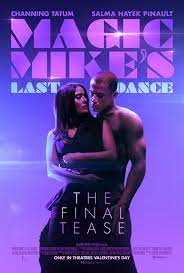
MAGIC MIKE'S LAST DANCE
US, 2023, 112 minutes, Colour.
Channing Tatum, Salma Hayek, Jemilia George, Ayub Khan-Din, Juliette Mohomet, Vicki Pepperdine, Alan Cox.
Directed by Steven Soderberg.
“A Zombie Apocalypse of Repressed Desire”.
This is one of the lines written by Reid Carolin, screenwriter for all three Magic Mike films, but given to a character who is a classical actress with ambitions to be more of a 21st-century star. She is referring to the atmosphere of women at strip shows – which was the atmosphere of the first two Magic Mike films. This one is somewhat different – and has definitely not found favour with many audiences, fans of the first two films who wanted more of the same and have been disappointed at the restraint in this version.
What has happened to Mike in the last seven years! As Mike, Channing Tatum might have got older but he has kept absolutely fit and athletic. We see him now as a bartender at an elaborate Florida social function, charity raiser, hosted by Mazandra Mendoza, Salma Hayek (but more about her screen presence and performance later). She is disappointed in her marriage, to a wealthy entrepreneur, about to be divorced, emotionally needy, theatrically ambitious. Very quickly she invites Mike to her lavish room, invites him to dance which he does at length, sensually, sensuously, athletically, and she offers to pay him for sexual favours. Next she is making a proposal to him to come with her to London and to put on a show.
Most of the film takes place in London, the renovation of a classical theatre, Max’s ambitions to put on a strip show spectacular, in good taste for a wider audience.
Lots of background, clash with her husband and his continually thwarting her ambitions, reporting her to Westminster Council, delays, and a shrewd move where the dance cast goes on to the top deck of a London bus and performs a routine captivating the rather prim officer in charge, played by Vicki Pepperdine – who immediately stamps approval.
There are auditions, there are rehearsals, there are routines. At this stage, it should be said that this is a strip show which is 99% just shirts off only, not like the shows which encouraged that female Zombie Apocalypse referred to earlier. Rather, while again the moves are sensual, most of the dancing is athletic, gymnastic, acrobatic, and some gyrating. And, for those getting impatient, there is quite a spectacle of successive acts at the end, Mike himself was acting as director and resisting performing, persuaded to do a segment with about arena – all in the rain.
There is a subplot with Max’s precocious daughter, Zadie, who has her observations about her mother, about Mike, about the show. And there is the butler full of sardonic comments and full of sardonic silences-chauffeur, Victor (Ayub Khan-Din).
While Channing Tatum’s Mike is pleasantly subdued, the same can’t be said for Salma Hayek’s presence and performance. For many (most?) her Mexican Spitfire routines, her range of moods, her shouting and ranting will be annoying (more than mildly).
Steven Soderberg directs again, audiences wondering about his fascination for the stripper stories.
